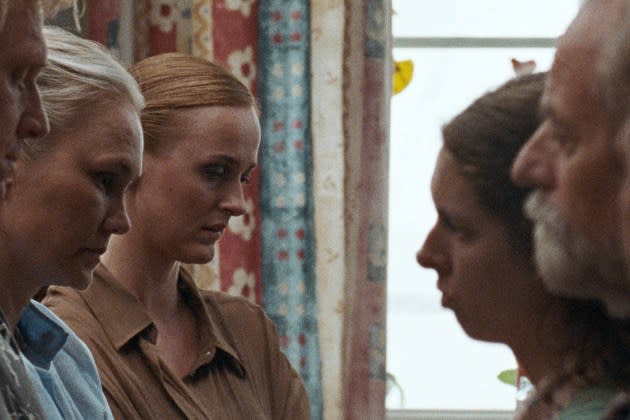‘Armand’ Review: Ingmar Bergman’s Grandson Directs Renate Reinsve as a Mother Defending Her Son in Ambitious School-Set Drama

Norwegian writer-director Halfdan Ullmann Tondel takes some big swings with his first feature Armand, not all of which connect, but the ambition and risk-taking are largely impressive.
A single-setting drama that unfolds in an echo-filled elementary school after hours, it stars Renate Reinsve (The Worst Person in the World) as local celebrity Elisabeth, the mother of never-met Armand, a first-grade boy who is accused by his classmate Jon, also never seen, of sexual abuse.
More from The Hollywood Reporter
When the boys’ teacher and key school staffers call a meeting with parents to decide the next steps, Elisabeth clashes with Jon’s parents, Sarah (Ellen Dorrit Petersen) and Anders (Endre Hellestveit), although not all is as it seems. The basic setup recalls, among other stories about accusations, Roman Polanski’s adaptation of stage play Carnage, but Armand gets much weirder as it goes on, with choreographed dance sequences and melodramatic revelations that feel contrived and tacked on to make the film more arthouse and less issues-driven-middlebrow.
Reception in Cannes has been largely warm following its debut in the Un Certain Regard strand, and Armand has racked up some offshore sales.
Bit by bit, Ullmann Tondel’s screenplay reveals that Elisabeth and Sarah have more history than shared playdates for their kids. They’ve known each other since they were children at this very same school, and Elisabeth was married to Sarah’s brother, who is now dead, possibly from suicide after a tempestuous relationship with Elisabeth. Reinsve plays her character here as a woman trying to live as normal a life as possible and be the best mother she can be, even though she’s well aware how her fame changes the dynamic in every room she enters — though egalitarian-minded Norwegians often try to seem unimpressed.
That’s certainly the case with the boys’ classroom teacher Sunna (Thea Lambrechts Vaulen), who, although she looks young, is trying to appear as professional as possible and handle the whole situation by the book. The school’s principal, Jarle (Oystein Roger), is mostly concerned with covering his back and avoiding any escalation that would get him in trouble. School safeguarding lead Ajsa (Vera Veijovic) is there to back him up with policy advice, but when she keeps getting uncontrollable nose bleeds the constant interruptions to the meeting only serve to escalate the tension.
The atmosphere could be cut with a popsicle stick from the start already, with prissy, judgy-faced Sarah ready to call the cops at any second and keen to put all the blame on Elisabeth. But Elisabeth is not to be trifled with, and she defends her son vigorously, pointing out that it’s only one kid’s word against another and questioning whether or not what was said was misinterpreted.
Back and forth the bickering goes until Ullmann Tondel starts to throw strange shapes into the drama. In the press notes he talks about the influence of films by Luis Buñuel, especially The Discreet Charm of the Bourgeoisie and The Exterminating Angel, and that’s felt in the increasingly surreal touches, as when Elisabeth suddenly gets an uncontrollable fit of giggles — a scene that goes on uncomfortably long. While that feels closer to Buñuel’s taste for shock moves and absurdist mystery, the sequences of Elisabeth suddenly breaking into a choreographed pas de deux with the school janitor (Patrice Demoniere) and later an almost orgiastic ensemble dance with a larger cast just seem self-indulgent and silly.
Some may find themselves straining to find artistic traces here of the work of Ullmann Tondel’s grandparents, Ingmar Bergman and Liv Ullmann, but millennial-generation Ullmann Tondel’s directing style feels more of a piece with contemporary Nordic cinema, with its flights of fancy and quirky humor, than the high style of his progenitors. His screenwriting here, however, feels like it’s lost its way when it tries to tidy everything up in the final scene, even if the staging strains to maintain a sense of mystery by drowning out the dialogue with thrashing rain.
Best of The Hollywood Reporter

 Yahoo News
Yahoo News 